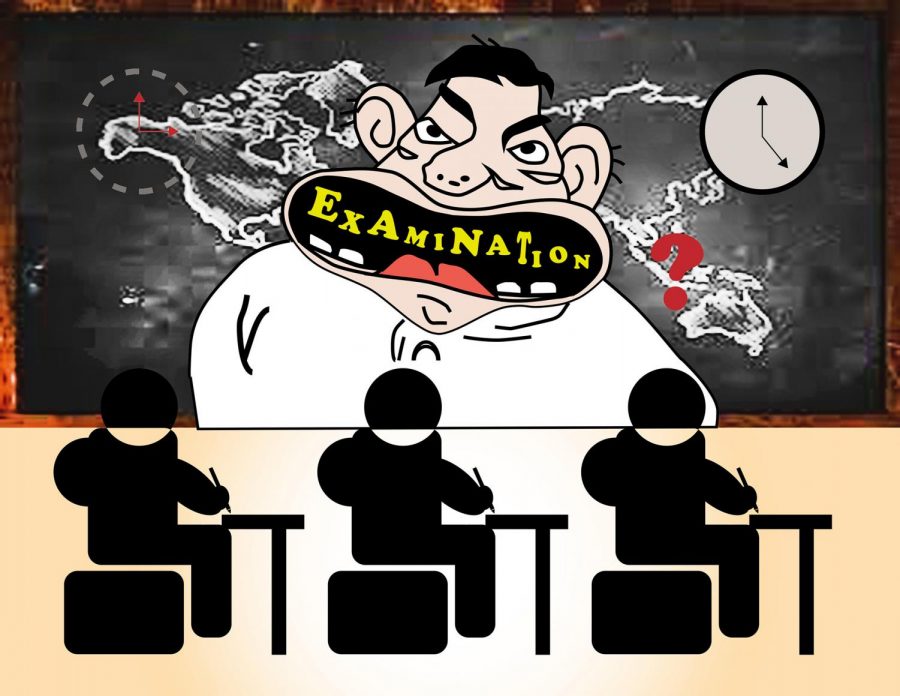OPINION: Instructors need to administer fewer exams
Tests only check memorization, not concept application
Exams are only useful for classes that require heavy memorization of facts or formulas. For subjects like history or English, essays or projects could work better to illustrate knowledge of concepts and help students retain information effectively.
October 4, 2019
WSU classes should test less frequently.
Tests are a common part of college settings, usually given three to four times per semester. Impending tests can bring mixed emotions to students, including stress and anxiety. Students often prepare for exams by devoting large and sometimes unhealthy amounts of time to studying in hopes to receive a decent grade.
Tests should not be as important to students’ grades as they are made out to be. Oftentimes, students find themselves memorizing names and dates over actual critical thinking and comprehension of material. The pressure put on students to do well on tests does not accurately reflect the role tests can take in students learning, which is often minimal. They’re largely impractical and not useful for the modern classroom.
However, tests are necessary in certain settings where terms need to be memorized in order to fully comprehend a subject. They are also often the only way a student can demonstrate skills in many math classes. Even so, there is little educational gain exams can provide in classes such as English or history.
To acknowledge this stress on students, some professors are eliminating exams in their curriculum altogether. Clif Stratton, WSU clinical associate professor of history, has not administered a test in eight years. He said this was a deliberate decision made to benefit students.
“I found that [tests] produced unnecessary anxiety,” Stratton said. “Another reason was that they encouraged memorization over understanding, and for history at least, that’s not as important.”
Stratton finds other ways to get his students to apply the knowledge they learn in his class about history to current events, like assigning papers to be written or further research to be done, and engaging students in class discussions.
This allows students to practice synthesis skills, observe trends across history and work on collaboration with their peers. These abilities are more valuable and practical than the memorization of sometimes insignificant information solely for the purpose of repeating it on a test.
Another way professors are adjusting to a more modern style of teaching is through the “flipped classroom” method. In this design, what the student takes away from class is up to them. Students take notes and complete short quizzes online as homework in order to learn the information outside of class. Class time is spent discussing the material and putting it into context.
The flipped classroom model is applied to engage students in a more contemporary style of learning. In a flipped classroom, the focus is not on transferring information from the professor to the students and having them regurgitate it onto an exam. This eliminates the need for tests.
Erin Tomson, WSU Clinical assistant professor, inherited a flipped classroom when she came to teach at WSU. The model works for her Com 102 public speaking class because the application of skills in practice is more important than memorizing concepts.
“You can read about how to write a good speech introduction basically on your own, and then coming to class we can use that time to look at examples and critique speeches,” Tomson said. “For this discipline, it works well because it’s more of a practice-oriented discipline than a strictly knowledge-based one.”
More classrooms should adopt a test-free environment. Tests are useful in settings where memorization of concepts and vocabulary is critical to learning, but they cause unnecessary stress and anxiety for students in classrooms where time could be better spent practicing skills.
The removal of exams for course content reflects a more modern classroom setting.
“The traditional way of assessing student knowledge is the professor lectures and pontificates knowledge and the student takes it in. It’s an information transfer sort of model,” Tomson said. “Our society has evolved, the way that we learn has evolved, the way that we share information has evolved, so teaching also needs to evolve.”

















